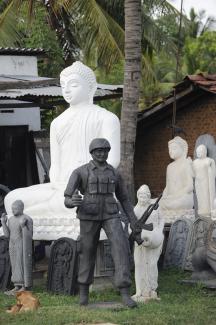South Asia
Still estranged

The conflict between the Sri Lankan government and the Liberation Tigers of Tamil Eelam (LTTE) was a bloody one. It claimed an estimated 100,000 lives, 40,000 of them in the final months of the war. The Tigers intermittently imposed an authoritarian and inhuman regime on the northern and eastern provinces under their control. They recruited child soldiers and suicide bombers, they murdered moderate Tamil politicians and extorted protection money, and they expelled Muslims and Sinhalese from their territory.
In May 2009, the civil war came to a harrowing end, with hundreds of thousands of civilians caught between the fronts. However, the annihilation of the Tigers by Sri Lanka’s armed forces was supported by many people – not only among Singhalese, who make up 75 % of the population, but also among Muslims (seven percent of the population) and Tamils (18 %). When the gunfire ceased, there were high hopes for peace and democracy.
Since then, a certain amount of progress has been made. According to the ministry responsible, half a million persons displaced by the war have been resettled in the north and another 250,000 in the east. Government sources claim that nearly all of the 12,000 LTTE fighters who were taken prisoner at the end of the war have been rehabilitated – among them 600 child soldiers. In September 2011, the government also revoked the state of emergency declared in 1983, but at the same time, it toughened up anti-terrorism legislation.
The government’s strategy for stability and reconciliation relies on growth. The economy has boomed since the war ended: Sri Lanka’s gross domestic product (GDP) grew by 8.2 % in 2011, which was the highest growth rate in South Asia, and followed that up with 6.4 % growth in 2012. The reconstruction of the infrastructure destroyed in the former conflict zones and the social development of the country are proceeding apace.
The prospects are not bad. Sri Lanka has long scored well in the Human Development Index of the UNDP (United Nations Development Programme), which measures not only economic performance but also takes into account progress in education and life expectancy. Sri Lanka ranked 92nd out of 197 countries in 2012. It was thus well ahead of other countries in the region.
Sacred land
Despite this progress, the Tamils – who are mostly Hindus – and other religious minorities still face discrimination. Many Sinhalese regard Sri Lanka as a sacred land of Buddhism and see themselves as a chosen people. The Sri Lankan army’s triumphant victory over the Tamil Tigers has strengthened Sinhala-Buddhist chauvinism even more.
The Tamil minority has been demanding political rights ever since the country (then Ceylon) gained independence from the British colonial power in 1948. Every government so far has been dominated by the Sinhalese, and none has had the political will to pave the way for Tamil participation. Those in office have always prioritised Sri Lanka’s territorial integrity – and they saw a strong centralist government as a guarantor of unity. In the eyes of anyone subscribing to that view, minorities that claim political rights are a threat.
The different ethnic groups have been deeply divided for generations. Polarisation and distrust have not diminished since the war ended. On the contrary, the minorities have become even more estranged. One reason is the way the past is being dealt with:
- On 18 May, the anniversary of the end of the war, ceremonies are held to commemorate the soldiers who died in the conflict but not the innumerable
- civilian victims.
- The government still denies that the armed forces killed Tamil civilians. The military set up a commission to punish possible abuse perpetrated by soldiers, but in February 2013, this commission came to the conclusion that only the LTTE was responsible for civilian deaths.
- The government recently embarked on the first construction phase of the Sandahiru Seya project (the triumphant Stupa), erecting monumental Buddhist temples in all nine provinces of the country. The Ministry of Defence sees the stupas as “an appreciation of the noble service rendered by the armed forces and police to defeat terrorism and bring lasting peace to the country”.
While mosques, churches and Hindu temples all over the country are falling into disrepair, Buddha statues are mushrooming. That is an affront for the minorities. The archaeological digging underway at ancient Buddhist sites in former LTTE areas is also perceived as a provocation by Tamil Hindus, as researchers’ findings are used to legitimise the Sinhalese claim to the whole of Sri Lanka. Many fear a “Sinhalisation” of the north and east.
The UN Human Rights Council has twice called upon Sri Lanka to investigate war crimes. In response to international pressure, the government set up a Lessons Learned and Reconciliation Commission in 2010. This Commission suggested to establish a fact-finding commission to research the fates of the many missing people. Moreover, it proposed to reform the institutions that are tasked with the protection of human rights. The government’s action plan of 2012, however, ignored these recommendations, and the minorities are uncomfortable with the growing role of the Sinhalese-dominated military in the country (see box).
Religious minorities
Recent months have also seen the emergence of anti-Muslim hate campaigns, mostly stoked by right-wing radical Buddhist monks. They call for a ban on the burqa and on the sale of halal food (food prepared according to Muslim doctrine). There have been repeated reports of attacks on mosques and Muslim-owned shops.
Christian churches have also become a target for attack. Radical Buddhists see Muslims and Christians as a threat to the unity of the Sinhala-Buddhist state. Like India’s Hindu chauvinists, they complain about – statistically unsubstantiated – high Muslim birth rates and alleged forced conversions to Christianity (see interview with Father Painadath in D+C/E+Z 2013/05, p. 209 ff.).
President Mahinda Rajapaksa has appealed for moderation and tolerance. However, his Sri Lanka Freedom Party is known to have close links with extremist monks.
In the wake of the latest developments, the minorities are becoming ever more alienated from the Sri Lankan state. There seems to be a reluctance to allow them to participate in – and contribute to – political and social life. At the same time, political power has become centralised since the end of the war, putting democracy and rule of law to the test. In this context, the Rajapaksa government is using the minorities issue to consolidate power without addressing the causes of the civil war.
Authoritarian tendencies
Victory over the Tamil Tigers brought considerable popularity for Rajapaksa, who was elected president in 2005 and re-elected in 2010. Under his leadership, the United People’s Freedom Alliance (UPFA) won an absolute majority in the 2010 parliamentary elections. The UPFA also governs seven of Sri Lanka’s nine provinces. In 2010, the parliament amended the constitution to remove the two-term limit for the presidency. Since then, the president has also had far-reaching control over the administration, police and law courts. Parliament barely performs its assigned functions, and the impeachment of Chief Justice Shirani Bandaranaike in January 2013 has set limits on the independence of the judiciary at the highest level.
In view of the overwhelming dominance of the executive branch of government, basic rights are clearly at risk. Dissent is unwelcome, journalists and human rights activists are threatened. Even with the war over, there are still cases of arbitrary arrest, torture and disappearance. Confidence in state institutions is low – not only among the minorities. The erosion of the rule of law and the consolidation of authoritarianism do not make a good basis for lasting peace.
The Northern Province, which is currently under the administration of the central government, is scheduled to elect a provincial council in October. The provincial council system was created in 1987 partly for the purpose of providing political rights to the Tamil minority. Because of the civil war, however, the system never took hold.
Now elections are due to be held soon, but before that happens, the government in Colombo wants to push through an amendment to curb the – already rather limited – powers of the provincial councils. That step would waste an important opportunity to address the main cause of the civil war: the lack of representation for the Tamil minority in politics.
Bettina Meier lives in Berlin and has worked for the Friedrich Ebert Foundation and for Transparency International in Sri Lanka. This article expresses her personal views.
bettina_meier1@gmx.de











